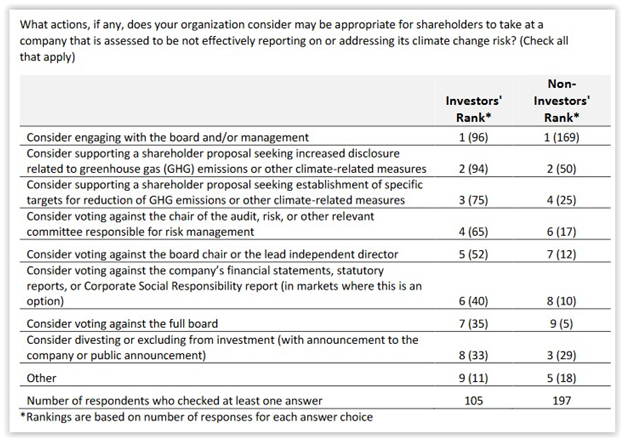ISS announced its launch of a new specialty Climate Voting Policy (see also International) that reportedly leverages its ISS ESG data and analytics, and is available for investors beginning this month for the 2020 proxy season. Factors used to evaluate a company’s climate-related performance fall under five primary categories: (i) norms violations (based on violations of globally recognized climate norms); (ii) disclosure indicators aligned with the TCFD recommendations; (iii) current performance indicators, including greenhouse gas emissions data; (iv) future performance indicators drawing from the ISS's Carbon Risk Ratings; and (v) sector-specific materiality using ISS's Carbon Risk Classification. Among other things, the policy provides that ISS will or may recommend votes against individual directors, board committees or the entire board for perceived climate risk oversight shortfalls.
Note that director accountability for climate change risk was among the topics covered in ISS's 2019 Benchmark Policy Survey and which the Society specifically commented on here (Page 6). According to ISS's summary of the results of that survey, both investor and non-investor (e.g., corporates) respondents ranked shareholder/company engagement as the #1 action they believed appropriate for shareholders to take at a company that "is assessed" (by ISS, in this case) to be not effectively reporting on or addressing its climate change risks, as shown here:

The final policy updates that ISS published in November did not include this topic.
ISS indicates that the new Climate Voting Policy reach is 3700 companies globally and that it will expand to include more companies over time. Current coverage includes the US: S&P 500 & Russell 1000; UK: FTSE 100; Germany: DAX 30; Australia: ASX 200; France: CAC 40; OMX Copenhagen 20; OMX Stockholm 30; and the STOXX Europe 600.
Access additional resources on our Proxy Advisors page. This post first appeared in the weekly Society Alert!